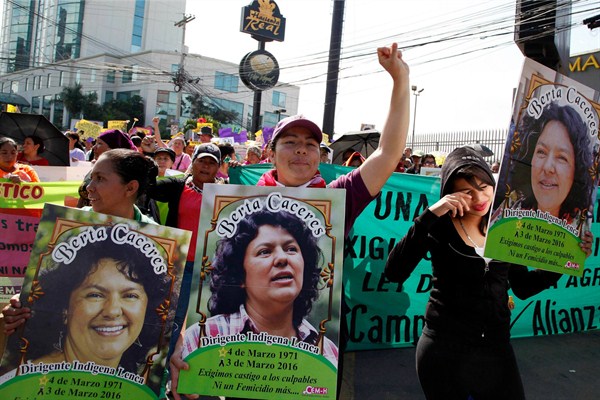On March 3, Berta Caceres, a prominent indigenous and environmental activist, was murdered in her home in La Esperanza, Intibuca, in the mountains of Honduras. Caceres was a campaigner for the rights of her native people, the Lenca, and a staunch opponent of one of Central America’s biggest dam projects. Her shocking murder was but the first recent example of the growing threat to human rights activists across Latin America. Less than two weeks after Caceres’ assassination, her fellow activist Nelson Garcia was murdered during a community eviction in the village of Rio Chiquito in northern Honduras. The next day, Guatemalan environmental activist Walter Mendez Barrios was murdered. Mendez, a member of the Association of Forest Communities of Peten, had been an opponent of hydroelectric dam projects along the Usumacinta River in northwestern Guatemala.
Their deaths came after a bit of good news for human rights defenders in the region. In February, police in El Salvador arrested four former military officers in connection with one of the most notorious atrocities of the country’s 12-year civil war: the 1989 murders of six Jesuits, their housekeeper and her 15-year-old daughter at the University of Central America in San Salvador. The officers were arrested under a Spanish arrest warrant—five of the six Jesuits were Spanish—seeking their extradition, which was originally issued in May 2011. The fate of the arrested officers, as well as another 12 missing officers named in the warrant, is currently pending before the Salvadoran Supreme Court. A U.S. judge in February also approved the extradition of Inocente Orlando Montano Morales, a former Salvadoran colonel, in connection with the killings.
Meanwhile, in Guatemala, a court on Feb. 26 handed down a landmark decision convicting two army officers of sexual slavery and sexual violence against indigenous women in the town of Sepur Zarco during the country’s 36-year civil war. The two defendants were sentenced to a total of 360 years and ordered to pay $1 million in compensation. It was the first time ever, anywhere in the world, that a case regarding sexual slavery committed during an armed conflict was prosecuted in the country where it took place, rather than in an international tribunal. As the defendants prepare their appeal, only time will tell whether the verdict will be upheld or overturned, as was the case in the 2013 genocide trial of Guatemala's former military ruler, Efrain Rios Montt. His retrial resumed last week.

